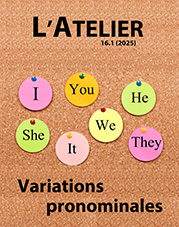Impersonalising the We-Narrative: Jon McGregor’s Reservoir 13
Résumé
Jon McGregor’s Reservoir 13 is characterised by a poetics of impersonality relying on an idiosyncratic use of personal pronouns. This applies to the characters’ discourse, presented in a hybrid, unusual form, but also to the narrator’s, which at times erases all pronouns while at other times resorting to passive forms and “there was/were” impersonal forms that are concentrated to a remarkable extent. This logic of subtraction is instrumental in mediating the voices of the village, but also, through the juxtaposition of vignettes and cross-species non sequiturs, it helps give visibility and voice to the assemblages of the human and the nonhuman that characterise the life of the valley. In other terms, the novel paradoxically uses the appearance of a third-person narrative to achieve the collective effect of a we-narrative. In so doing, it edges towards nonhuman narration and helps destabilise the tenets of anthropocentrism. It contributes to the development of a brand of material realism that is itself a contribution to the evolution of the novel’s mimetic agenda in an age dominated by the effect of the Anthropocene and the hyperobject of species extinction.
Keywords: Reservoir 13, Jon McGregor, Anthropocene, de-anthropocentrism, impersonality, material realism, nonhuman narration, non sequitur, subtraction, we-narrative
Téléchargements
Publiée
Numéro
Rubrique
Licence
-
L’envoi spontané d’un article à la rédaction de L’Atelier implique l’autorisation de publication et la cession des droits dans les limites établies par la loi de propriété intellectuelle.
-
L’Atelier conserve les droits de reproduction des articles publiés, quelque soit le support : internet, CD ROM, réimpression, photocopie, etc.
-
L’auteur conserve le droit de publier ultérieurement son article déjà paru dans L’Atelier avec la seule obligation de mentionner le nom de la revue comme source de la première publication.


